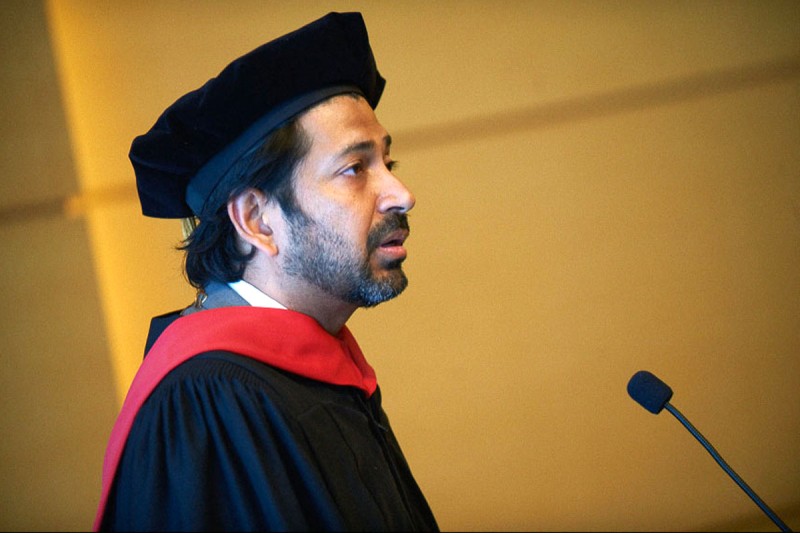
Siddhartha Mukherjee addresses graduates and guests at the 2013 Commencement.
“Newspapers may bring us news of a scientific-industrial complex that is increasingly depersonalized … where terabytes of data are churned through supercomputers to generate gigabytes of information,” observed physician-scientist and writer Siddhartha Mukherjee. “But ask a real scientist and you get a profoundly different image of how real science happens.”
Dr. Mukherjee, the author of The Emperor of All Maladies: A Biography of Cancer, which won the 2011 Pulitzer Prize for General Nonfiction, delivered the Commencement address at Memorial Sloan Kettering’s 2013 Commencement and Academic Convocation. He is an assistant professor of medicine at Columbia University and a staff cancer physician at Columbia University Medical Center.
“Science,” Dr. Mukherjee asserted, “is among the most profoundly human of our activities. Far from being subsumed by the dehumanizing effects of technology, science in fact remains our last stand against it.” Invoking “the indelible image of Gregor Mendel, a monk in wire-rimmed glasses, tending his plants, stooping with paint brush and forceps, to transfer the orange dust of pollen from one flower to the next,” he described a quality he called the “tenderness” of the scientific enterprise.
Tenderness
“It’s not a word typically used to describe science or scientists,” Dr. Mukherjee acknowledged. “It describes a certain intimacy between human beings and nature, a nourishment that must happen before investigation can begin.”
Dr. Mukherjee framed his talk by asking how Mendel, working in the mid-1800s in the garden of his monastery, “stumbled upon what is arguably the most seminal discovery of modern biology: that hereditary information is transmitted from one generation to the next.”
“His science began with tending,” noted Dr. Mukherjee. “The laborious cross-fertilization of seedlings … the markings of wrinkles on seeds [which] led him to findings that could not be explained by the traditional understanding of biology or inheritance. Tending generated tension until the old fulcrum of biology was snapped in two.”
Out of Tenderness … Tension
“Tenderness and tension,” said Dr. Mukherjee, “the two qualities that I think define science. Tenderness has to do with the day-to-day life of a scientist… . When I witness science in action, I see this tenderness in abundance.”
“On Monday morning, the graduate students and postdoctoral fellows in my laboratory rush in to see how their cells have grown over the weekend. The best of these researchers have a gardener’s instinct: Some cultures need nourishment; some need to be left alone to inhabit the corners of incubators; and yet others need to be coaxed with growth factors to flourish… . “
And then, explained Dr. Mukherjee, “out of those years of tending comes tension — that spectacular crystallizing moment when all the pieces of a puzzle come together on the verge of making complete sense.”
The Addiction of Science
Speaking directly to the graduates, Dr. Mukherjee offered the following counsel: “First, as you go into the world, remember to tend whatever you do. Be tender. Grow things. Put your hand and mind to work.”
“Second, don’t ignore the tension. There’s a reason both words arise out of the same root, Latin for ‘stretch.’ Stretch yourself and cultivate the tension… . Third, take advice about what you can do but be careful about taking advice on what you cannot do.”
Here, he summoned personal experience: “Had I asked someone if I could write a 600-page book while running a lab and being a fellow, I know what I would have heard. My crucial advantage was, I didn’t ask!”
Finally, Dr. Mukherjee urged that the graduates not forget “the addiction” of science. “When you see the crystal, you forget the labor of growing it… . It is as if someone designed the perfect narcotic for a particular kind of addict.
“To experience it is — and I can only use an addict’s words here — to find a high that is so profound, so unique and powerful, so mesmerizing, that it makes the labor of getting to the high seem immaterial.”
The Medal for Outstanding Contributions to Biomedical Science
At the conclusion of his address, Dr. Mukherjee received the Memorial Sloan Kettering Medal for Outstanding Contributions to Biomedical Science, which is awarded each year to the keynote speaker.
Memorial Sloan Kettering’s Commencement and Academic Convocation honors students whose doctoral dissertation work was conducted in Memorial Sloan Kettering laboratories, and students in the Louis V. Gerstner, Jr. Graduate School of Biomedical Sciences receive their PhD degrees. In addition, younger Memorial Sloan Kettering physicians, scientists, and postdoctoral research fellows, as well as established clinicians and investigators from Memorial Sloan Kettering and beyond, are recognized